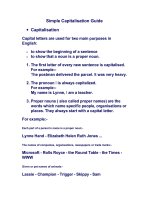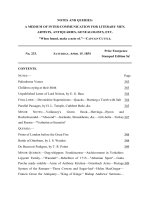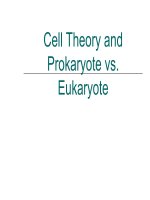- Trang chủ >>
- Đề thi >>
- THPT Quốc Gia
s2016 notes
Bạn đang xem bản rút gọn của tài liệu. Xem và tải ngay bản đầy đủ của tài liệu tại đây (204.28 KB, 4 trang )
STUDY NOTES
EPISODE 16: GLASS ARTIST
NEGATION
STUDY TIPS
In English when we want to express an
opposite meaning, give a negative reply, say
something is not true or, perhaps, show a
negative attitude toward something, we use
negation or negatives.
In the expression ‘I disagree’, the prefix ‘dis-‘
negates the positive word ‘agree’, and
conveys an opposite meaning. Responding
with ‘no’ or ‘never’ gives a negative reply.
Using ‘n’t’ in ‘he wasn’t late’, tells us that
something is not true – the person in fact was
not late.
If someone says ‘John’s hair is rather long’,
they would be thinking that his hair is
somewhat too long; using ‘rather’ conveys the
message that they disapprove. These are
some of the many different ways of negating
and forming negatives, which are widely
used in both formal and informal, spoken and
written English.
Remember that it is important to
expand on your answers in the
Speaking test, especially in
Section 3.
When expressing your opinion or
providing an explanation,
incorporate some subtle negative
meanings and use a variety of
different negative forms in your
answers. This will allow you to
demonstrate your use of particular
grammatical forms and precise
meanings of negative words.
Being able to disagree in a variety
of ways will give you a greater
command of communication
events.
Forming Negatives / Conveying Negative Meanings
There are various ways of forming negatives or conveying a negative meaning in
English. These can be broadly categorised under the following headings:
negative statements/questions
negative affixes
double negatives
words with negative meanings
expressions emphasising the negative
negative transfer
The table on the following pages summarises the forms and uses of negatives for
each of the categories.
Page 1 of 4
Negation
Form and Use
adding not or -n’t to a verb or an auxiliary; this is the most
common way of negating
Examples: She’s not talking. It isn’t raining. He might not attend
the meeting. I didn’t see the film. Don’t worry! Not having
attended the class, I couldn’t complete my assignment. Why
wasn’t she invited? Did he not see the exit sign? Wouldn’t it be
nice to see the Great Wall of China?
Negative
statements/
questions
negative words/expressions: not; nor; nothing; nowhere; neither;
never; no; nobody; none; no one; neither…nor; not only
if a negative word is used in a sentence then such words as any,
anyone, anybody, anything, anywhere etc., are used
Examples: The test was not easy. He was nowhere to be seen.
There was no comment from the journalist. Have you been to the
Middle East? – No, I haven’t. Are there any biscuits left? – Sorry,
none. Did you say the table or chair? – Neither. He never has
anything nice to say about the company.
polite requests or offers using not
Examples: Wouldn’t you like to attend the Grand Prix?
Why don’t you go with me to the beach?
Negative affixes
negative prefixes or suffixes can be added to verbs, nouns and
adjectives to give them an opposite meaning
a-, an-
atypical, amoral
anti-
antidote, antibiotic, anticlockwise, antidepressant, anti-oxidant,
antiperspirant, antisocial, anti-virus
contra-
contraception, contradiction, contraindication
counter-
counteract, counterbalance, counterclockwise, counterfeit,
counterintelligence, countersign
de-
decaffeinated, decode, decentralise, decontaminate, deregulate,
devalue
dis-
disappear, disengage, disenfranchise, disfavour, dislike,
disheartening, dishonest, dishonour, disconnect, disapprove,
disadvantage, disinformation, dissimilar, disloyal, disorganised,
displeased, displeasure, disprove, disrespect, dissatisfaction
dys-
dysfunctional, dyslexia
il-
illegal, illegible, illiterate, ill-conceived, ill-defined, illegitimate, illequipped, ill-informed, illogical, ill-prepared, ill-suited, ill-tempered
im-
imbalance, immaterial, immoderate, imperfect, impossible, immobile,
immodest, immoral, impersonal, impolite, imprecise
Page 2 of 4
Negative affixes
continued
negative prefixes or suffixes can be added to verbs, nouns and
adjectives to give them an opposite meaning
in-
inability, inaccurate, inaction, inactive, inadequate, inadvisable,
inapplicable, inappropriate, inarticulate, inaudible, incapable,
incoherent, incompatible, inconclusive, inconsistent, incorrect,
incurable, indecent, indistinct, ineffective, inexcusable, inflexible,
insignificant, invisible, involuntary
ir-
irrational, irreconcilable, irregular, irrelevant, irresponsible,
irreversible
mal-
maladjusted, maladministration, malcontent, malfunction,
malnourished, malpractice, maltreat
mis-
misadventure, misapply, misbehave, miscalculate, misconduct,
misdiagnose, misfortune, misguided, misinterpret, misjudge, mislay,
mislead, mispronounce, misread, misrepresent, misspell, mistreat,
mistrust, misunderstand, misuse
non-
non-alcoholic, non-aligned, non-attendance, non-cooperation, nonessential, non-existent, non-fiction, non-fat, non-negotiable, nonpayment, non-profit, non-refundable, non-renewable, non-scientific,
nonsense, non-smoker, non-specific, non-toxic, non-verbal
un-
unable, unacceptable, unapologetic, unattractive, unavailable,
unbalanced, unbelievable, uncertain, uncompromising, unconfirmed,
uncomfortable, unconscious, uncontrollable, uncover, undesirable,
uneducated, unemployed, unfair, unfit, unfortunate, unfriendly,
unhealthy, uninformed, unintelligible, unkind, unlikely, unlock,
unlucky, unpack, unpleasant, unpopular, unproductive, unproven,
unqualified, unreal, unsafe, unstable, unthinkable, unusual,
unwanted, unwelcome
-less
careless, endless, heartless, helpless, homeless, lifeless,
meaningless, mindless, nameless, pointless, powerless, senseless,
speechless, thoughtless, useless, worthless
Double
negatives
usually only one negative is used in a clause or sentence; when
two negatives are used they generally cancel each other and
have the opposite meaning – a positive meaning; they are used
sometimes to emphasise a point or make something less
definite
Examples: Nobody can be unhappy. (=somebody is happy); Our
holiday in the tropics was not unpleasant. (=not bad, but not nice
either); She didn’t misunderstand. (=understood, but in a less
definite sense).
Page 3 of 4
Words with
negative
meanings
these words are negative in meaning and suggest a negative
attitude; they are not negatives in form
few, little, only (=not much)
quantifiers
Examples: He had few friends after the debacle.
Little was known about his whereabouts.
rarely, seldom (=not often); hardly, scarcely, barely (=almost not);
rather, completely, utterly
adverbs
Examples: John seldom helps with the chores.
Things have barely changed since the reforms two years ago.
It’s rather warm in this room.
avoid, deny, fail, forget
verbs
Examples: He failed his test for the second time.
Mitchell avoided the jurors’ eyes during the trial.
these are expressions which are added to a negative sentence
to emphasise the negative aspect
Expressions
emphasising the
negative
Negative
transfer
at all; whatsoever; ever; in the least; the least bit; in the slightest; a
bit
Examples: Jane is not the least bit worried about passing the test.
She could barely eat anything at all.
There is no need whatsoever to accompany him to the hearing.
Do you think he has a chance of getting into the MBA program? –
None whatsoever.
when introducing a negative idea with such verbs as believe,
suppose, think, it is the introductory verb which is negated, not
the second verb
Examples: I don’t think you’ve tried any of the cakes.
I don’t suppose she’ll help us with the work in the garden.
the words below are used with not to soften the negative
meaning
very; absolutely; entirely, necessarily
Other
Examples: His actions were not very helpful.
Because it’s expensive doesn’t necessarily mean it’s the best.
not can be used for contrast in order to emphasise something
positive
Example: It’s not a five-star, but it is comfortable.
Page 4 of 4









